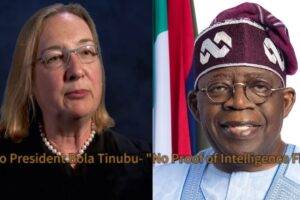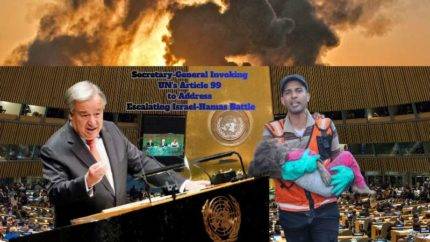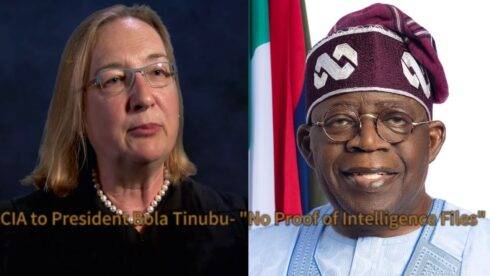Activation of Dormant UN’s Article 99
UN Secretary-General António Guterres has taken the unprecedented step of invoking UN’s Article 99 of the UN Charter to expedite action by the UN Security Council in response to the ongoing Israel-Hamas conflict. This dormant provision grants the secretary-general the authority to draw attention to issues that pose significant threats to international peace and security. Historically seen as a preventative measure, UN’s Article 99 aims to raise global awareness of escalating crises.
In his letter to the president of the Security Council, Guterres emphasized the potentially irreversible regional consequences of the Israel-Hamas conflict, underlining the urgent need to prevent a broader humanitarian disaster. The catalyst for activating UN’s Article 99 is rooted in the belief that lasting regional stability and the security of both Israelis and Gazans hinge on the elimination of Hamas. As a growing number of UN members acknowledge, supporting Israel’s mission, rather than calling for an immediate ceasefire, is seen as the true path to achieving lasting peace.
UN’s Article 99, Amidst Controversial Ceasefire Vote Divides Security Council
The decision to invoke UN’s Article 99 comes as the UN Security Council faces challenges in passing a resolution for an immediate truce and a lasting ceasefire. With a rising number of Palestinian casualties due to the Israeli ground offensive in Gaza and increasing fears of the conflict spreading to neighboring countries, Guterres’ intervention highlights the need for swift and decisive action. The international community grapples with the unprecedented nature of this request, underscoring the severity of the situation and the urgency for a resolution.
The UN Security Council’s recent vote on a ceasefire in Gaza has sparked intense controversy, revealing deep divides among its 15 members. Out of these, 13 voted in favor of an immediate ceasefire, reflecting growing global concerns over the escalating violence. However, Israel and its supporters vehemently opposed the resolution, viewing it as protective of Hamas, a group they label as a murderous terrorist organization. The vote has brought attention to the challenging task of obtaining accurate casualty figures, with Hamas providing data that some consider questionable due to past narrative inconsistencies.
US Vetoes Ceasefire Resolution, UK Abstains Amidst Invoking UN’s Article 99
In a move that further highlights the geopolitical complexities surrounding the Israel-Hamas conflict, the United States exercised its veto power to block a resolution in the UN Security Council calling for a permanent ceasefire. This decision aligns with the U.S. stance on supporting Israel’s right to defend itself. Simultaneously, the United Kingdom abstained from the vote, positioning itself neutrally on the matter. Despite the global push for a cessation of hostilities, the UN’s senior leaders warn that without a halt in the fighting, delivering aid to the millions of Palestinians trapped in the war zone would become nearly impossible. The international community continue to grapple with finding a resolution that could match UN’s Article 99 to the escalating crisis.
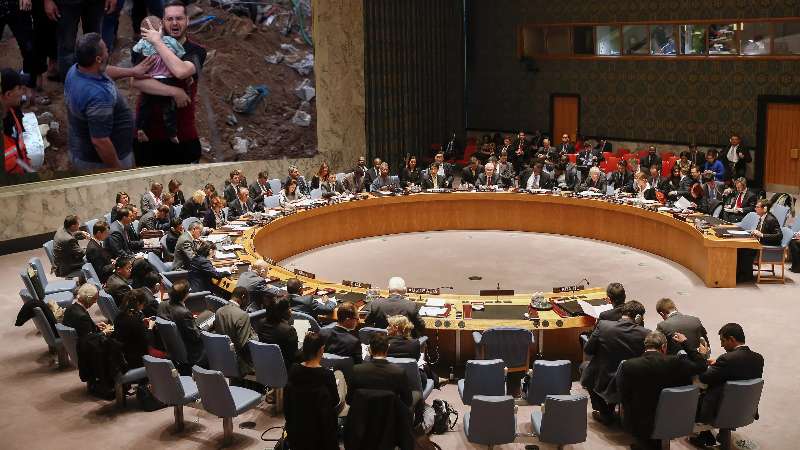
US Stands Firm on Israel’s Conditions for Ceasefire
In a significant development, the United States has aligned itself with Israel’s position that a lasting resolution to the ongoing conflict with Hamas requires the dismantling and removal of the group from power in the Gaza Strip. The U.S. argues that any attempt to end the war without addressing the root cause—Hamas’s presence and actions—would only lead to a resurgence of violence, citing the recent terrorist attack on Oct. 7, in which 1,200 Israelis lost their lives. This stance has drawn criticism and condemnation from Palestinian Authority President Mahmoud Abbas, who accused the U.S. of being complicit in the bloodshed of civilians in Gaza.
According to the Palestinian official news agency WAFA, Abbas labeled the U.S. veto of a UN Security Council resolution for an immediate ceasefire as “unethical” and a “blatant violation of all human values and principles.” He specifically held the United States accountable for the “war crimes committed by the Israeli occupation forces against the Palestinians,” urging the international community to intervene before the crisis escalates into a religious war with global implications.
UN Support for Israel Faces Challenges Amidst Rising Tensions
Despite historical support from the United States, the backing of Israel in the current conflict has faced challenges, both domestically and internationally. While the U.S. has traditionally been a staunch supporter of Israel, the ongoing crisis in Gaza has brought the nation into uncharted territory. The recent actions of Hamas, including a hostage situation resulting in the death of an Israeli man, have complicated the narrative, making it increasingly difficult for any nation to defend the group’s existence.
The United Nations, historically divided on the issue of Israel, finds itself navigating a complex diplomatic landscape with an impending introduction of UN’s Article 99. The global community grapples with balancing the longstanding alliance between the U.S. and Israel against the atrocities committed by Hamas, as evidenced by the death of Sahar Baruch during the Oct. 7 attack. The situation adds urgency to finding a solution that addresses the root causes of the conflict while ensuring justice for the victims and their families.
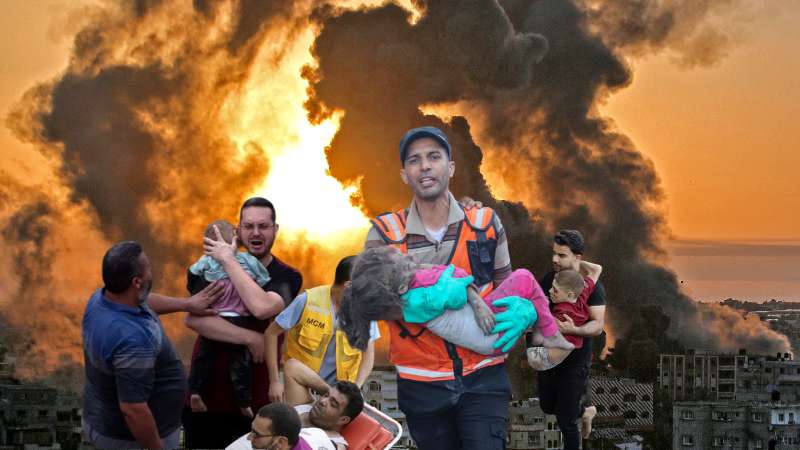
Navigating Uncharted Diplomatic Waters
The ongoing Israel-Hamas conflict has reached a critical juncture, with the international community grappling with unprecedented challenges and complexities. UN Secretary-General António Guterres’ activation of UN’s Article 99 underscores the urgency of addressing the crisis, as the lack of a Security Council resolution for an immediate ceasefire has left the situation precarious. The United States’ alignment with Israel’s conditions for a lasting resolution has drawn criticism from Palestinian President Mahmoud Abbas, highlighting the deep-rooted tensions and opposing perspectives in the diplomatic arena.
The ongoing conflict has taken a tragic turn with the Hamas continuing maltreatment and killings of hostages. Just few moment ago, one of those victim is Sahar Baruch, a 25-year-old Israeli man who was held hostage by Hamas militants during their Oct. 7 attack on southern Israel. Baruch, one of more than 240 people taken captive, was said to have been executed in some reporting. The Kibbutz Be’eri, his home, and the Hostages and Missing Families Forum Headquarters released a joint statement expressing sorrow for his loss.
The tragic death of Sahar Baruch, further accentuates the brutality of the conflict and the human toll it exacts. As the world witnesses the unfolding events, the delicate balance between historical alliances and the need for justice becomes increasingly challenging. The United Nations faces a daunting task in navigating these uncharted diplomatic waters, with the specter of a religious war looming.
The global community must remain vigilant and proactive in seeking a resolution that addresses the root causes of the conflict, ensures accountability for war crimes, and fosters a path to lasting peace. The coming days will be crucial in determining whether diplomatic efforts can overcome the complexities and pave the way for a more stable and secure future for the region.
Table of Contents
Discover more from OGM News NG
Subscribe to get the latest posts sent to your email.


